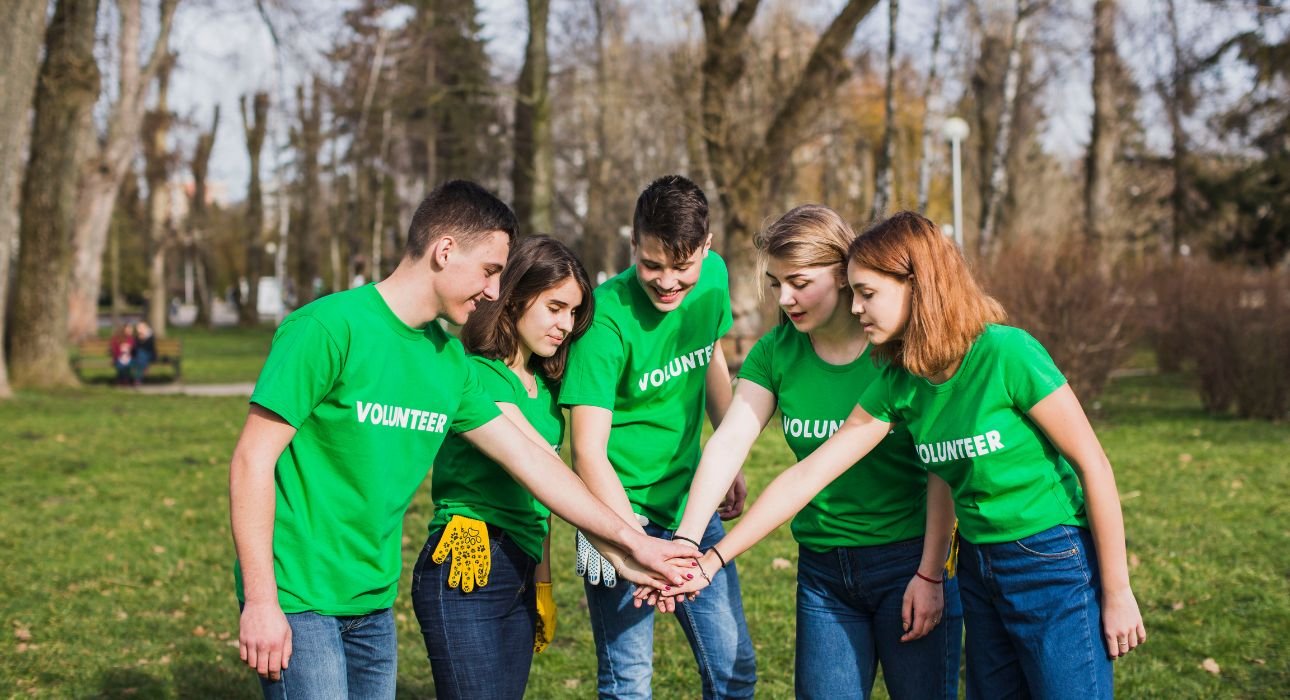“Volunteers do not necessarily have the time; they just have the heart.” — Elizabeth Andrew
During college days, Arjun volunteered at a shelter to learn how to manage food inventory and coordinate time schedules. At first, he didn’t like going to it, but after some weeks, he started to accept the changes in himself. He developed his communication skills, empathy, and motivation, and years later, during his job interview for a logistics company in a team leader role, he confidently discussed how he worked in the settings with zero training and gained skills all while volunteering. The interviewer was very impressed not only by his initiative but also by his real-world problem-solving and team leadership.
Volunteering isn’t just an act; it’s an accelerator or a drive that pushes the individual toward workplace readiness. In a world where employers seek more than degrees, volunteering offers real-life or practical experiences that sharpen emotional intelligence, communication, and professional confidence. It highlights how volunteering enhances skills like communication, leadership, and emotional intelligence, which are critical in professional settings and helped Arjun a lot.
Read More: The Role of Emotional Intelligence in Leadership, According to Psychology
Enhancing Communication Skills
Recently, workplaces have demanded skills such as emotional intelligence, adaptability, teamwork, and communication. These aren’t taught in classrooms, but volunteering can naturally demand and develop them. Volunteering also cultivates relational skills and self-efficacy, which are the strongest in the workplace. Volunteers learn to work with diverse teams, manage conflict, handle unexpected challenges, and adapt communication to various audiences, all in low-stakes but high-impact environments.
Whether it’s organising a charity, mentoring students, or helping in disaster relief, these experiences simulate work pressure, planning, and multi-stakeholder management. In 2016, Harvard released that Managers tend to hire volunteers as a “proxy for professional experience”, especially among fresh graduates, which helps them in developing their communication skills and empathy.
Effective communication is a cornerstone of workplace success, and volunteering creates this skill through diverse interactions. It is found that volunteers improved verbal and interpersonal skills by 25% after engaging in community projects.
Example: Hirthik is an unemployed individual who works part-time in the neighbourhood shop. Even though he earns money for his living, he still feels emptiness in himself. A friend recommended him to a volunteering community, and he joined with hesitation at first, after knowing all the services and the work. He enjoys the volunteering work and started to make a voice for other individuals. He said that he developed his communication skills, empathy, togetherness, and a sense of purpose.
Read More: How to Speak so that People Will Listen: Psychology Behind Communication
Developing Leadership and Teamwork
Volunteering often involves leading or collaborating on projects, building leadership and teamwork skills. Unlike the complicated corporate hierarchies, volunteering often allows individuals, even beginners, to take initiative, propose solutions, and lead micro-projects. This autonomy builds confidence, accountability, and entrepreneurial thinking. In 1997, Bandura, in his self-efficacy theory, explained that overcoming challenges in volunteer roles boosts confidence in leadership.

Planning an awareness event or fundraising campaign mirrors many corporate functions, such as setting goals, managing budgets, delegating tasks, and conducting outreach. These skills translate directly into project coordination roles in the workplace. A 2019 APA report found that 68% of volunteers reported improved leadership abilities after organising community events.
For instance, a volunteer leading a charity fundraiser learns to delegate tasks and motivate a team, skills directly applicable to managing workplace projects. These experiences foster adaptability and conflict resolution, critical for team dynamics.
Read More: New Research Challenges Belief That Big Groups Hinder Teamwork
Building Emotional Intelligence
Emotional intelligence is composed of Self-awareness, empathy, social skills, motivation and self-regulation, which are very important in the workplace, and can be gained only through volunteering. Volunteering helps the individual to understand their strengths, weaknesses and emotions, and working with a diverse group of people helps the individual to develop empathy. Developing the skills allows the individual to be more confident, increase communication, improve problem solving, adaptability and time management, which is needed in the workplace. McKinsey predicts that by the year 2023, there will be an increased demand for emotional skills and in another study done by Lee Hecht Harrison, Penna mentioned that using EQ in the workplace leads to promotion.
Read More: Teenagers and Socio-emotional Skills
There are some tips to maximise the skill-building volunteering: they are
- Choose the areas you’re passionate about
- Take new challenges
- Seek feedback and reflect
- Set clear goals and objectives
- Combine volunteering with other activities.
Problem-Solving and Adaptability
Volunteering often requires creative problem-solving techniques in resourceless settings. In study found that volunteers who developed critical thinking by navigating challenges like limited budgets have shown greater success in their professional lives. For instance, organising a community health camp with limited supplies teaches prioritisation and innovation, skills valued in workplaces. Aron tends to doubt himself as he lacks the problem-solving skills after entering volunteering. He felt some changes, such as being confident in solving modern problems, thinking creatively to find ways to encourage others. It made him feel that stepping into the area of volunteering is the best choice he has ever made.

The experiential learning theory, given by the psychologist Kolb in 1984, emphasises that such hands-on experiences build reflective problem-solving, enabling employees to tackle complex tasks efficiently.
Ravi joins the volunteer team to plan a community called “health fair. It was going smoothly for 2-3 months after that, it faced challenges with the venue availability. He solved the problem by adapting the event format to an outdoor setting and coordinating with local partners for logistics. This made them gain more popularity in society. There are a lot of benefits in developing problem-solving and adaptability skills, and it makes the individual feel standout.
Read More: Kolb’s Learning Cycle: Understanding How We Learn Through Experience
Time Management and Organisational Skills
Volunteering means balancing multiple responsibilities, such as family-work and other related work of the individual. A study said that individuals who tend to manage their work and personal life during volunteering have shown to have a positive mindset, and individuals who serve by juggling their work and studies have improved their time management by 22%. For example, David is an employee at a private company, which is far away from his home and for a few months, he felt bad and thought of leaving the job, but after learning the time management skills, he excelled in his company and got the best performer award. His volunteering experiences helped him achieve the success he had dreamt of.
A volunteer managing a community workshop must schedule tasks and meet deadlines, mirroring workplace demands. These skills ensure efficiency in professional settings. There might be deadlines that cannot be finished, but it is ensured that the individual should make good use of the time and so which leads to the improvement of the organisation and the individual.
Read More: 10 Effective Time Management Techniques, According to Psychology
Conclusion
Volunteering improves leadership, communication, and emotional intelligence, making it a powerful tool for preparing to work in the workplace. It offers practical experiences to develop communication skills, be confident in solving problems and have emotional intelligence. Volunteers gain self-efficacy and interpersonal skills, both of which are essential in the workplace. They gain knowledge of how to handle conflict, collaborate with diverse groups, and modify their communication for different audiences. Another advantage of volunteering is that it helps you manage your time better and balance many obligations. All things considered, volunteering is a useful instrument for developing professional abilities and getting people ready for the workplace.
Read More: Improving Workplace Satisfaction, Motivation and Productivity Using Positive Psychology
FAQs
1. How does volunteering improve communication skills?
Volunteering improves our communication skills in many ways, as we get to involve diverse interactions, and work with different NGO’s which enhances our verbal and empathetic communication. And it is very helpful if you are seeking any job opportunities.
2. Can volunteering develop leadership skills?
Yes, volunteering helps to develop leadership skills, as the individual gains experience from various settings. It builds confidence, delegation, teamwork, empathy and more info about the group bonding.
3. How does volunteering enhance emotional intelligence?
Emotional Intelligence (EQ) is composed of empathy, self-awareness, motivation, and so, is gained by the individual during the volunteering period. For example, Arun doesn’t have empathy toward the people, went to volunteer as a program and got to know the importance of it and started to understand the other side of the individual.
4. What workplace skills does volunteering teach?
Volunteering develops problem-solving, time management, and adaptability. It plays a crucial role in professional success. Such as Karthick, a final year student, analyses his skills before and after volunteering at the ABC shelter. Before joining the community, he didn’t have any idea about “how to solve real-life problems.” During the period, he learnt a lot of things, and after the training, he said to himself that he had developed the ability to solve problems confidently, managing time and quickly completing work.
5. Is volunteering beneficial for career growth?
Yes, it builds transferable skills like leadership and communication, making volunteers more competitive in the workplace. Just like Karthick and Arun, it creates an unimaginable transformation, both internal and external.
References +
American Psychological Association. (2019). Volunteering and workplace skills: A psychological perspective. https://www.apa.org/news/press/releases/stress/2019/volunteering-skills
American Psychological Association. (2020). The impact of volunteering on professional development. https://www.apa.org/news/press/releases/stress/2020/volunteering-professional-growth
Kolb, D. A. (1984). Experiential learning: Experience as the source of learning and development. Prentice-Hall.
Post, S. G. (2014). Altruism and health: Perspectives from empirical research. Personality and Social Psychology Bulletin, 40(9), 1123–1135. https://doi.org/10.1177/0146167214540188
Spector, P. E. (2015). Industrial and organisational psychology: Research and practice (6th ed.). Wiley.
Wilson, J. (2017). Volunteering and workplace competencies. Journal of Applied Psychology, 102(6), 845–857. https://doi.org/10.1037/apl0000184













Leave feedback about this